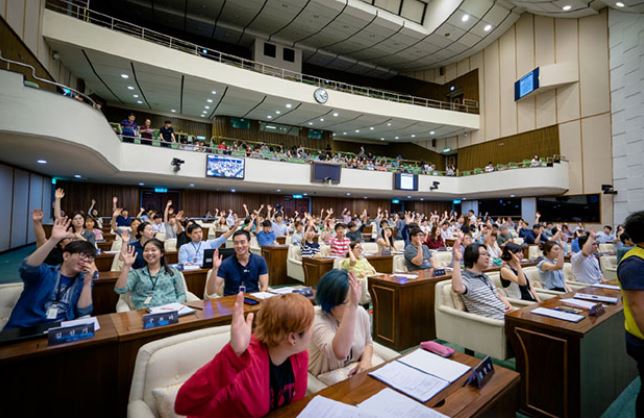[City Initiative News] Seoul Youth Parliament Members Deliver Constructive Policy Suggestions
Seoul Youth Parliament Members Deliver Constructive Policy Suggestions

The SMG will hold the Seoul Youth Parliament this year, as it did year. The session held this year displays collaboration among the private sector, bureaucrats, and the government as a project cosponsored by the Seoul Youth Policy Network and the Youth Development Special Committee of the Seoul Youth Parliament.
The Seoul Youth Parliament is one of the policy governance associations that take part in the SMG’s process of youth policy formulation. It was adopted last year on a trial basis.
The 139 Seoul Youth Parliament members were appointed among those recommended by the 400-plus members of the Seoul Youth Policy Network. The Seoul Youth Policy Network is a youth policy governance association that has been operated by the SMG since 2013. Its members are composed of young people aged 19-39 residing in Seoul or carrying out activities based in Seoul. The Network members appointed in April of this year took part in an initiation camp (with 200-plus people attending) and have carried out other activities since, such as local youth exchange sessions and informal policy-related meetings with officials of the SMG and members of the Seoul Metropolitan Council.
The Seoul Youth Parliament members have reviewed the SMG’s youth policies in areas such as employment, labor, housing, debts, bikes, pollution caused by dust particles, culture, health, youth allowance, the handicapped, civic education, and others at the session of the 11 sub-divisions. The sub-divisions have come up with nine youth-related policy measures, including how to cope with vacancy occurring in cooperative-type public housing and measures for one-person households (mostly of young people). The measures will be conveyed to the Seoul Mayor through the relevant manager-level officials.
Commenting on the activities carried out by the Seoul Youth Parliament members, Mayor Park Won-soon said, “Many good policy ideas are created by those who are there. I hope they identify our policy loopholes and come up with meaningful policy measures in response. We at the SMG will provide positive support for them so that they may prepare themselves for their roles as the future leaders of society.”
The Seoul Youth Parliament is one of the policy governance associations that take part in the SMG’s process of youth policy formulation. It was adopted last year on a trial basis.
The 139 Seoul Youth Parliament members were appointed among those recommended by the 400-plus members of the Seoul Youth Policy Network. The Seoul Youth Policy Network is a youth policy governance association that has been operated by the SMG since 2013. Its members are composed of young people aged 19-39 residing in Seoul or carrying out activities based in Seoul. The Network members appointed in April of this year took part in an initiation camp (with 200-plus people attending) and have carried out other activities since, such as local youth exchange sessions and informal policy-related meetings with officials of the SMG and members of the Seoul Metropolitan Council.
The Seoul Youth Parliament members have reviewed the SMG’s youth policies in areas such as employment, labor, housing, debts, bikes, pollution caused by dust particles, culture, health, youth allowance, the handicapped, civic education, and others at the session of the 11 sub-divisions. The sub-divisions have come up with nine youth-related policy measures, including how to cope with vacancy occurring in cooperative-type public housing and measures for one-person households (mostly of young people). The measures will be conveyed to the Seoul Mayor through the relevant manager-level officials.
Commenting on the activities carried out by the Seoul Youth Parliament members, Mayor Park Won-soon said, “Many good policy ideas are created by those who are there. I hope they identify our policy loopholes and come up with meaningful policy measures in response. We at the SMG will provide positive support for them so that they may prepare themselves for their roles as the future leaders of society.”